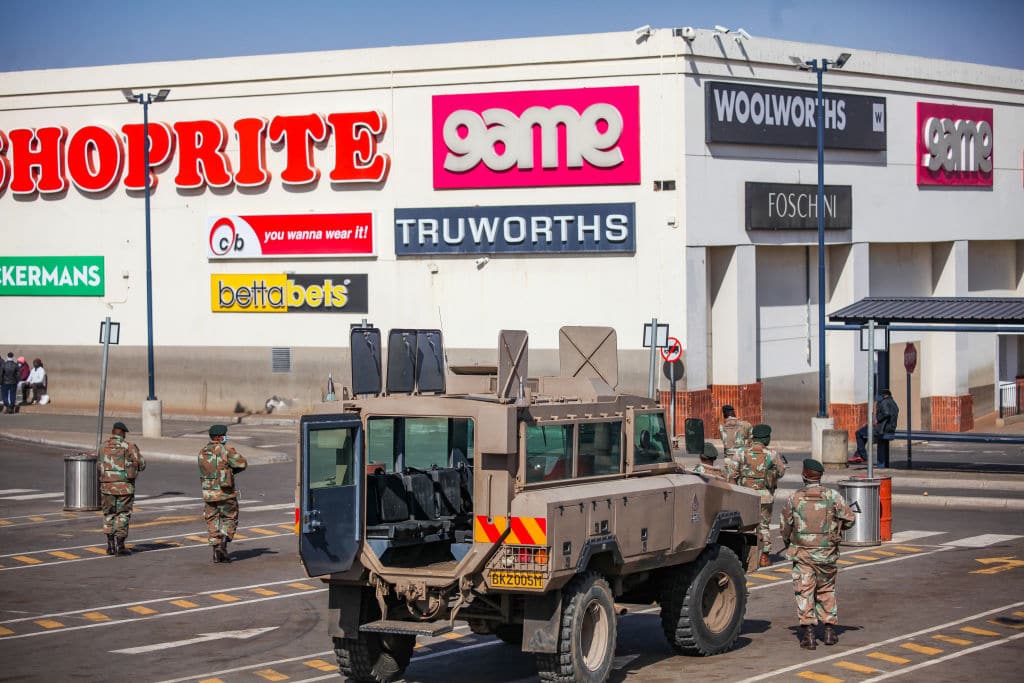Topline
In August 2021, South Africa’s President Cyril Ramaphosa appointed an expert panel to review the government’s response to the public protests and civil unrest that rocked the country’s Gauteng and KwaZulu-Natal (KZN) provinces in July. The report on “the spate of orchestrated public violence, destruction and sabotage in July 2021” revealed that over 300 people died, thousands were injured and at the end of the week of unrest, approximately R50 billion ($3.2 billion) was wiped off the South African economy.
Key Facts
Vandalism, looting, riots, “political protests” and “anarchy” erupted in two of South Africa’s biggest economies, Gauteng and KZN. The protests, which followed the arrest of South Africa’s former president Jacob Zuma for contempt of court, began in KZN, Zuma’s homestead, where he was incarcerated at the Estcourt Correctional Centre. The civil unrest saw multiple businesses, buildings and properties destroyed during the week of destruction. The protests continued in Gauteng, in places such as Soweto, Jeppestown and Alexandra.
The expert panel was appointed a month later to investigate the cause of the outbreak as well as the consequences.
The panel, which consisted of Professor Sandy Africa, as chair, and advocate Mojanku Gumbi and Silumko Sokupa, found that a combination of complex multi-dimensional and obscure factors formed the background and led to the “outbreak of violence never before seen in our post-apartheid democracy, leading to contestations in the public space, including between senior members of government, over how to characterize it”.
The violence that broke out was viewed in the context of multiple crises and challenges facing South Africa, the report found key among them:
- The weakness of State institutions generally, a phenomenon that has been referred to as the hollowing out of State institutions;
- high unemployment, with youth unemployment above 70% and no consistent, continuous plan to address this challenge;
- inherited high levels of poverty and deep inequality;
- poor spatial planning, leading to overcrowded and unsuitable living conditions for many, with informal settlements emerging in crowded urban spaces as people move to the cities in search of opportunities;
- rampant corruption at various levels of government;
- the phenomenon of sponsored State Capture, as understood in the South African context.
- the frustrations caused by the Covid-19 restrictions, adding to the feelings of despair among the population.
The panel also concluded that although the looting, destruction and violence “have come and gone”, little has changed in the conditions that led to the unrest since July 2021. There have been further concerns by the public that similar eruptions may take place.
“The question, many argue, is not if and whether more unrest and violence will occur, but when it will occur,” the report read.
The report also revealed how shopkeepers, managers or shop personnel found their businesses looted by their own regular customers. Furthermore, there was a sense of bewilderment at the absence of the police at the time – the report found that police failed to stop the unrest.
“In most areas, the police became spectators as one mall after another was destroyed; as one truck after another was torched; as people came back day after day to finish looting whatever was left from the previous day.”
Ramaphosa in a statement said he will outline the first actions the government will take in response to the findings and recommendations of the report Thursday, February 10 2022 during his State of Nation Address.
Tangent
In their recommendations, the panel said it goes without saying that the capacity of the security services needs to be strengthened to respond effectively to all situations. This includes both the South Africa Police Services (SAPS) as well as the South African National Defence Force (SANDF). The government, at all levels, are also encouraged to “seriously attend” to the socio-economic challenges facing the country.
“Poorly rolled out programmes of service delivery and unacceptable living conditions, the state of the economy, and the persistent levels of poverty, served to provide the ripe environment to light the tinder box that was the incarceration of former President Zuma that led to many poor and desperate people joining in the looting, alongside those more calculating in their objectives and motivation,” the report read.
Crucial Quote
“Mr. President, you asked us to determine whether the response by the security services was timeous, appropriate and sufficient. The answer to that, in respect of the police and the intelligence services, is an unequivocal no. Many reasons were proffered for this failure, but in the end, the response remains that they failed to do the necessary to protect life, limb and property. The reasons are set out in the body of our report. The Executive, however carries some of the blame too and must take responsibility for its lapse of leadership,” the panel said in their concluding assessment.
